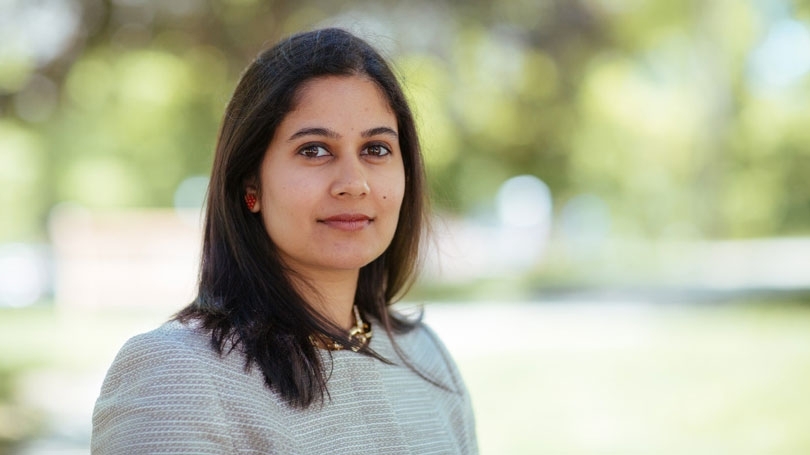- Undergraduate
- Foreign Study Program
- News & Events
- People
Back to Top Nav
Back to Top Nav

Assistant Professor of Religion Zahra Ayubi has received a grant from the Greenwall Foundation’s Faculty Scholars Program in Bioethics to continue her research on the intersections of bioethics, gender, and religion within the context of Islam. She is one of four scholars from around the country to receive the award this year.
The Faculty Scholars Program provides financial support—half of a full-time faculty salary—for three years, but the benefits of the grant extend far beyond funding, Ayubi says. The program includes the opportunity to receive mentorship from senior scholars, participate in biannual conferences, and become part of the Greenwall Foundation’s larger community of bioethics researchers.
“The foundation is really interested in mentoring early- and mid-career researchers,” Ayubi says. “There’s a lot of support, and that’s exciting for me. At our home institutions, we exist in our own research silos, so being able to be plugged into a larger bioethics community is invaluable.”
The Greenwall network has given her a warm welcome. “The entire bioethics community sponsored by Greenwall is aware of what my project is about, and I’ve gotten a lot of positive feedback already,” she says.
Ayubi’s project focuses on examining “the ontological and philosophical conceptualizations of Muslim women’s bodies within religious literature and practice,” she says. Through study of the literature and interviews with women and medical practitioners, she’s investigating “how ethics decisions about Muslim women’s medical care can be used to address much larger issues relating to how to care for and attend to women’s bodies and the gendered nature of human life.”
For example, her work looks at how religion comes into play in how people make critical decisions about things like organ transplants and reproductive health, and who, within Muslim families, makes those decisions, using what criteria.
“Often these choices are gendered,” she says. “Certainly, religious authority has been dominated by men within the Muslim tradition. But within a family tradition, it might be that the women of the family take care of each other, a typical dynamic that was largely disrupted by colonial introduction of male-dominated allopathic medicine to Muslim societies. Are women making the decisions on a family level? If not, then who is? How do they come to those decisions? These are questions that we can’t necessarily assume answers to. We need to look at the gender dynamics as well as the religious dynamics.”
Ayubi’s project extends research she began last year with the support of a New Directions in the Humanities grant from the dean of the faculty—an interdisciplinary award that aims to give scholars in the arts and humanities opportunities to expand beyond their specialties. That support gave her time and resources to design the project, she says, “helping me gain access to the bioethics discourses and literature, and begin collaborations with Muslim physicians and hospital chaplains.
”In addition to contributing to the scholarship, Ayubi wants her research to help educate Muslim patients and their health care providers about ways of thinking through how religion and gender affect bioethics and health care decision-making. The ultimate goal of her project, Ayubi says, “is to work toward creating both religion- and gender-informed bioethics principles for Muslim women’s care.”
“I hope the research will help patient and care-provider communities address some of the ethical dilemmas and precariousness in Muslim women’s health care,” she says. “The Greenwall Foundation’s network of bioethics scholars is going to be invaluable to me as I develop principles for Muslim patient and care provider education.”
- by Hannah Silverstein for Dartmouth News Today